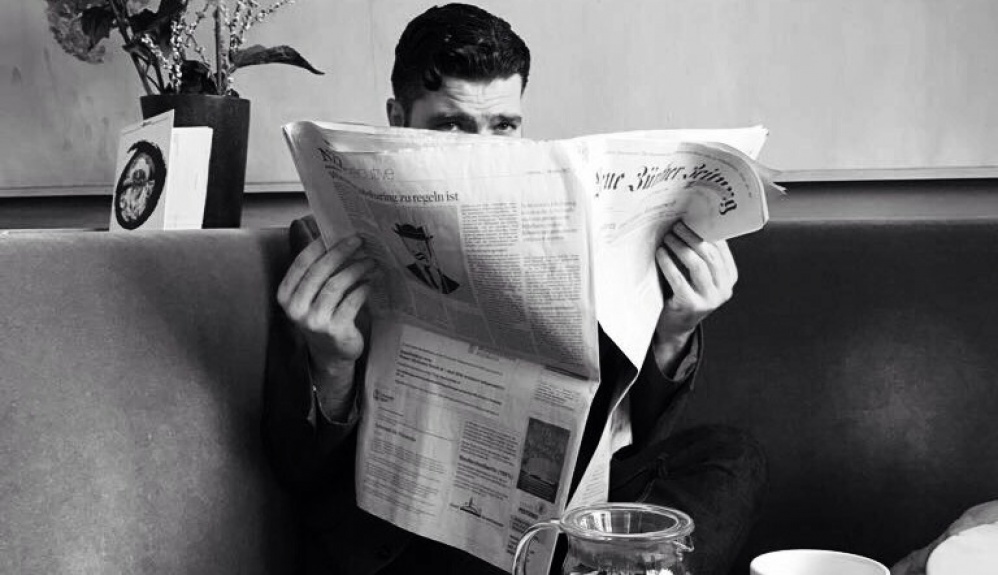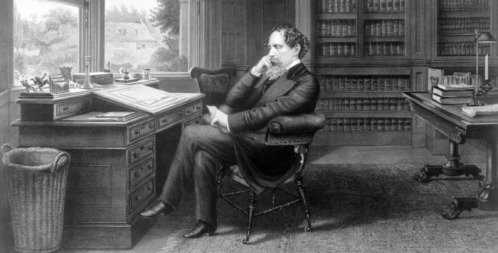Interview: Daniel James

Ahead of the release of his first novel, The Unauthorised Biography of Ezra Maas, Living North caught up with North Tyneside-based author Daniel James to discuss all things books
When did you become interested in the life of Ezra Maas?
I first heard the name Ezra Maas when I was at university, but I can’t remember the exact context. A few of my friends were studying Fine Art and liked to name drop their favourite artists, so I suspect Maas’s name came up then, alongside the likes of Picasso, Joseph Beuys, Marcel Duchamp, and Jean-Michel Basquiat. I just recall being intrigued by Maas’s sinister artworks and his reputation as a recluse. He seemed like a genuine enigma. Years later, when I was working as an arts and culture journalist, Maas’s name would come up every now and then, but his life and work were always just on my periphery. He was never my actual focus. The artists, writers and musicians I interviewed would occasionally mention him in passing when they talked about their influences, but I didn’t really give Maas a second thought. I had no reason to at the time. Of course, this all changed about eight years ago when I received a phone call late at night asking me if I would be interested in writing his biography.
At what point did you realise your research into his life could become a book?
Almost immediately. It didn’t take long for my research to reveal a number of contradictions and inconsistencies in the authorised version of Maas’s life and, naturally, the journalist in me began asking questions. The more I asked, the more secrets I uncovered, and I soon found myself being warned off the story. Of course, as soon as that happened I knew I had found something special and there was no turning back.
Was it a big jump going from journalist to author?
Journalism teaches you a lot about storytelling, both from a technical perspective – structure, clarity, economy, accuracy – but also how and where to find stories, what things to look and listen out for, and what questions to ask. You develop a different kind of awareness, you notice fine details, see and hear things that others wouldn’t, and all the time you’re filing it away for future reference. You become like a magpie, collecting the parts of people’s lives that appeal to your storytelling instincts, so that you can refashion them into something else.
In a newsroom, you have to absorb and process information very quickly in order write confidently about a topic before moving straight onto the next story. It’s very fast-paced, but these are great research skills to have. The pleasure about being a novelist is that you can take your time and go deeper – spending weeks, months, or even years researching a subject. Journalism also teaches you to write to a deadline and that is something every writer needs.
Finally, one of the most important lessons I learned as a journalist was to keep asking questions. Even when you think you know the whole story, keep going until you’re certain you’ve got the truth. Nine times out of ten, if you keep digging there’s always something hidden under the surface and it’s usually worth finding.
How much of the book is fiction?
We’re living in a very dangerous time where it is increasingly hard to tell truth from fiction. In some ways, my novel is very much of the moment, even though it is largely set in the past. It was a conscious decision to structure the book like a detective story, while also using newspaper clippings, letters, emails and phone transcripts to tell the story. I think the result is quite a unique experience, somewhere between fact and fiction, where the emphasis is on the reader to piece together the clues and ask themselves what’s real and what’s not. One of the reasons I chose this format was to explore the ambiguous relationship between truth and fiction – I find it fascinating. The other reason was my love of detective fiction. It occurred to me as I was researching the book that a biographer – in trying to reconstruct someone’s life after they’ve gone – is essentially a literary detective trying to solve a missing persons case.
As such, half of the book follows my investigation into the truth about Ezra Maas in the style of a mystery thriller, as I travel around Europe and America, visiting the galleries and studios where he worked, and interviewing his friends and collaborators.
The other half is Maas’s biography – from his birth in 1950, to his fame in the ‘60s and ‘70s, right up to his disappearance in the present day, complete with reproductions of authentic documents and correspondence. It’s very much based on a true story, which meant I had to seek permission from the estates of a number of famous people, alive and dead, who knew or worked with Maas at some point in the last six decades. This was a complicated process and led to a number of delays. The Maas Foundation refused to cooperate of course, but I’m very grateful to those who allowed me to include their stories in the book. The award-winning writer and artist Bryan Talbot (who now lives in the North East) tells a brilliant story about working with Ezra Maas in the late 1980s and early 1990s, and he kindly agreed to let me print the tale in full. Similarly, Professor Brian Ward – one of the UK’s most respected American Studies academics – gave me permission to include a great anecdote involved Maas and the US author Thomas Pynchon from the 1970s. I think both stories prove the point that life is stranger than fiction.
Do you have any future projects in the works?
Yes. I’m halfway through a second book, with several more planned for the future. I’m also working with a filmmaker to turn some of the interviews we filmed during my research for the book into a feature-length documentary about Ezra Maas. The book may be finished, but I don’t think Maas is done with me yet.
Who are your literary inspirations?
James Joyce, Raymond Chandler, Samuel Beckett, Paul Auster, Thomas Pynchon, Philip Pullman, Philip K Dick, Jorge Luis Borges, and David Lynch.
What’s your favourite book?
I love so many books that it’s really hard to pick a favourite. I would struggle to name my top 10 to be honest, but here are a few books that I love in no particular order: The New York Trilogy by Paul Auster, His Dark Materials by Philip Pullman, The Big Sleep and other novels by Raymond Chandler, Nineteen Eighty-Four by George Orwell, Slaughterhouse 5 by Kurt Vonnegut, Watchmen by Alan Moore, Falling Angel by William Hjortsberg, Dracula by Bram Stoker, Wuthering Heights by Emily Bronte, Eye of the Beholder by Marc Behm, The Collected Short Stories of Philip K Dick, The Road by Cormac McCarthy, Labyrinths by Jorge Luis Borges, and Lanark by Alasdair Gray.
What would you want to do if you weren’t a writer?
Probably a filmmaker, painter or photographer. It would have to be something creative. Maybe a film director, if I had to choose one occupation, as I love movies – and the experience of going to the cinema and being transported to another world – as much as I love books.
What’s your favourite thing about Newcastle?
It’s my home. No matter where I go in the world, Newcastle is the one place I will always come back to. I love the beautiful architecture of Grainger Town, the River Tyne and its bridges, I love the North East coast, and the Northumberland countryside, I love the people and the culture. None of us get to have a say in where we are born, it’s pure chance, but I’m very proud to be from the North East and I always will be.
You’ll have plenty of opportunities to catch up with Daniel himself, as he’s got a jam-packed schedule in November. As well as his book launch at Forum Books Corbridge on 29th November (more details here), Daniel will also be appearing at Books on the Tyne 2018 and the Fiction After Dark event







